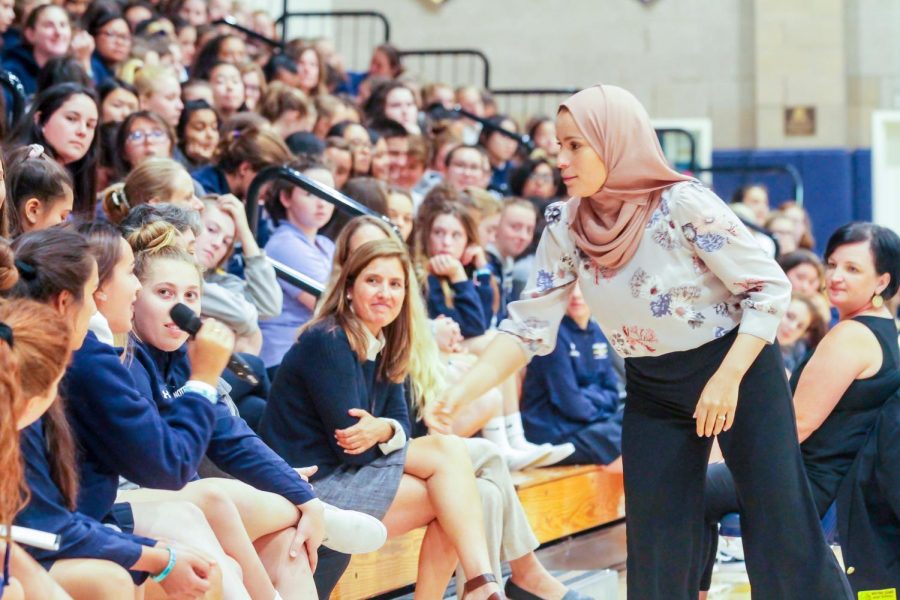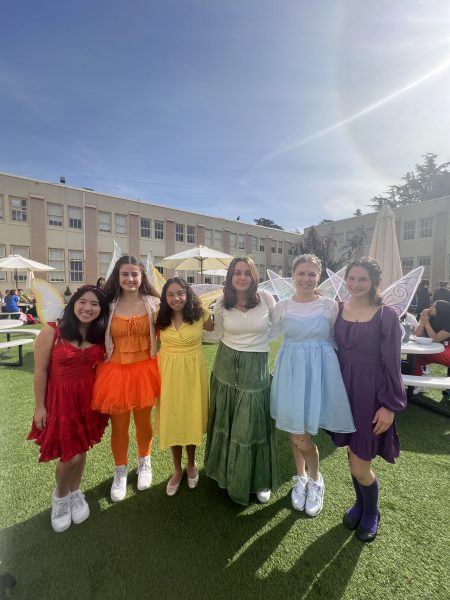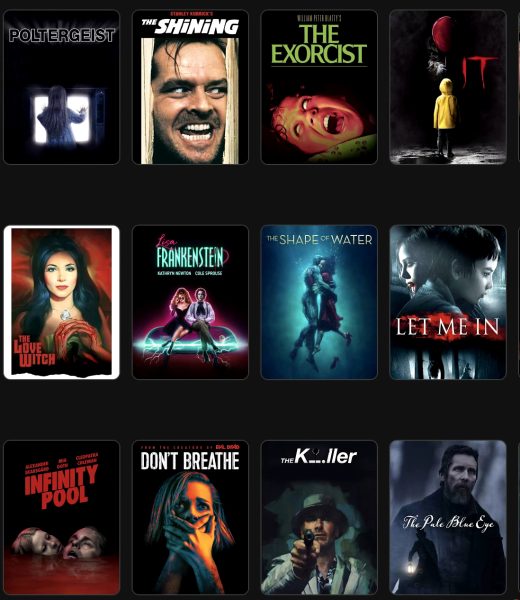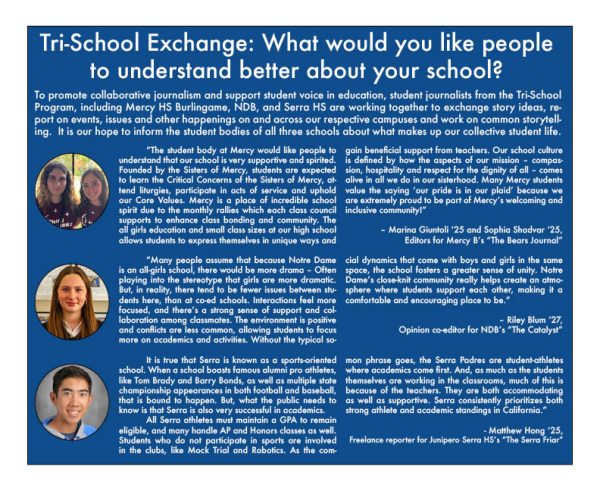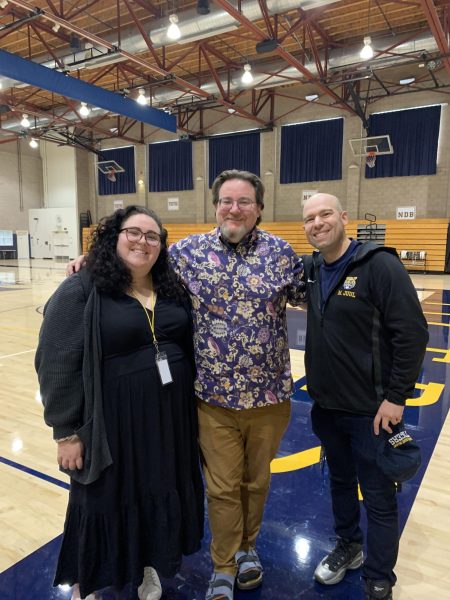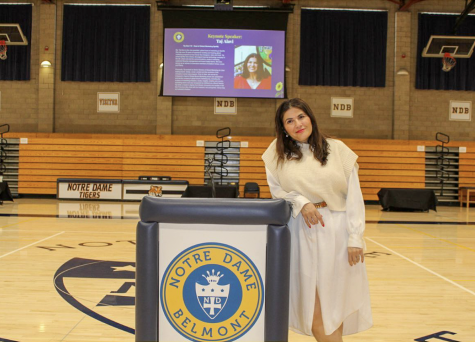Peace activist speaks to student body
The Catalyst / Robert Rojas
On Wednesday, September 12, the NDB community was treated to an empowering speech by women’s rights and peace activist, Dr. Alaa Murabit. The event was part of “Because I Care Week,” and two alumnae helped to secure her as a speaker.
At only twenty-eight years old, Murabit has founded and co-founded several organizations that advocate for women’s rights, particularly in war zones. She was inspired by her own experiences after she left Canada to attend medical school in Libya at the age of fifteen. In her senior year at med school, the Libyan Revolution broke out and Murabit was exposed first hand to the dire effects of war on women in a place of conflict.
This experience inspired her to found the Libyan Organization of Women at only twenty-one years old. Following her work with this organization, she was selected to advise the United Nations Security Council and to work as the United Nations’ Women and Sustainable Development Global Advocate.
Murabit facilitated a discussion regarding topics such as role models, the influence of social media, and self-confidence during her speech at NDB. Throughout her presentation, she asked questions to the student body and listened to responses, including a fireside chat with four students that she facilitated during the second half.
She posed the question, “Who are your role models and who do you look up to?” and discussed the challenges that these figures face. She also discussed the rise of social media and prevalence and access to T.V. shows that young women are exposed to today, telling students, “Your world is so much bigger than mine ever was.”
Murabit asked students whether they believed that social media was a positive or negative influence in their lives.
Overwhelmingly, students responded that it was a negative experience and influence. This led to a conversation about self-confidence and what it means to be confident and to be considered a confident woman.
She also opened up the discussion for students to ask her questions about her own experiences and inspirations in her work. She explained how she became more involved in social justice when focusing on women’s rights throughout the revolution to aid women who had been sexually assaulted in warfare. Murabit explained how her medical background helped her to focus on health, and how she views health as a base for helping developing nations.
In addition to an in-depth discussion about role models, Murabit talked about her journey with self-confidence, and the difference between peace in one’s self compared to assuredness in one’s ability or knowledge. She discussed how taking time to think about who you look up to and who loves or believes in you helped her to find positivity. She said that no one thing has defined her, saying, “I think a lot of bad things and a lot of great things shaped me and made me who I am.”
She also reflected on her own high school experience and facing trouble with bullying, explaining that the September 11 attacks happened before she entered high school, and that she was bullied a lot during that time in her life. Murabit discussed the importance of supporting other people’s growth and learning from your reactions to what others say, since, she advised, “The only behavior you are accountable for and have control over is your own.” Murabit also explained how her experiences have taught her to treat others well, and she said, “No matter where you have been in life, treat others with respect.”
Murabit also shared advice based on her own experiences on how to handle conflict tactfully when engaging with those that have differing opinions. She advised, “When you come to people, allow them to share with you first,” and explained the importance of showing respect for other people’s experiences and who they are. Murabit stressed the importance of understanding why others feel a certain way, and considering what they have been taught and what they have been taught to believe.
When asked what the biggest takeaway she wants NDB students and young women, in general, to internalize, she began, “I think the biggest thing, aside from not saying ‘Sorry’ all the time, which is a word I’ve come to hate, is take the time out of your own day and oftentimes out of your own insecurities or your own challenges, and give yourself a minute to appreciate where you are, why you’re there, and how far you’ve come, and what you can do because, I mean, high school was not a fun time for me, and the silver lining of it is, it is a significantly small portion of your life. It’s almost irrelevant.”
Murabit continued, “You can take that opportunity, the way you were treated, the way you felt in high school, the insecurities you felt, or maybe the security you felt, and really leverage that, to be able to cultivate a better environment for whoever comes after… I think these four years can really help you in cultivating what message you’re sending to the world, right, and what you want the future generation… to say about themselves and to see themselves in.”
She emphasized the importance of taking initiative to use one’s own experiences to help others in the same situation, saying, “If you felt bullied, then go out of your way to make sure nobody else feels like that… Go out of your way to remember these years in as positive of an outcome as you can because you’ll get the chance, you have the chance now, to better your school through your clubs and your activities, but you’ll get even more of a chance down the line, to better the experience for a whole new group of girls. And, I think that would be, my biggest piece of advice.”
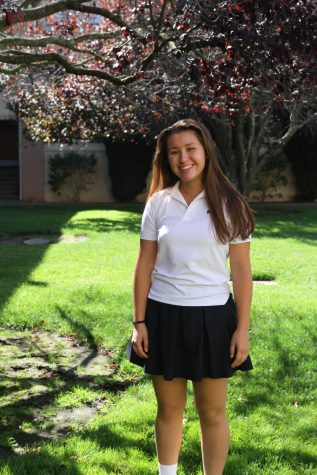
Johana Ligtenberg is a current senior and member of the Titan class of 2019. As the Editor-in-Chief, Johana Ligtenberg oversees all department editors...

